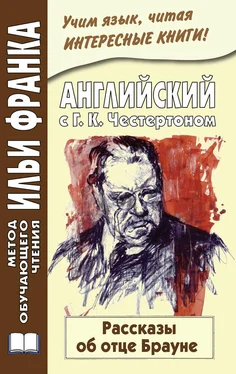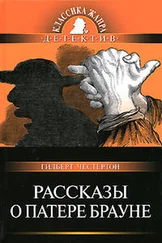
 How even such a banquet of bosh was got ready in the time remained a riddle. But they went at it with that mixture of recklessness and industry that lives when youth is in a house; and youth was in that house that night, though not all may have isolated the two faces and hearts from which it flamed. As always happens, the invention grew wilder and wilder through the very tameness of the bourgeois conventions from which it had to create. The columbine looked charming in an outstanding skirt that strangely resembled the large lamp-shade in the drawing-room. The clown and pantaloon made themselves white with flour from the cook, and red with rouge from some other domestic, who remained (like all true Christian benefactors) anonymous.
How even such a banquet of bosh was got ready in the time remained a riddle. But they went at it with that mixture of recklessness and industry that lives when youth is in a house; and youth was in that house that night, though not all may have isolated the two faces and hearts from which it flamed. As always happens, the invention grew wilder and wilder through the very tameness of the bourgeois conventions from which it had to create. The columbine looked charming in an outstanding skirt that strangely resembled the large lamp-shade in the drawing-room. The clown and pantaloon made themselves white with flour from the cook, and red with rouge from some other domestic, who remained (like all true Christian benefactors) anonymous.
The harlequin, already clad in silver paper out of cigar boxes(Арлекину, уже одетому в /костюм/ из серебряной бумаги, /извлеченной/ из сигарных ящиков; to clothe – одевать; silver – серебряный; серебристый; box – коробка; ящик ) was, with difficulty, prevented from smashing the old Victorian lustre chandeliers(с большим трудом удалось помешать разбить старинную викторианскую /хрустальную/ люстру с подвесками; to prevent – предотвращать; мешать; to smash – разбивать; luster – украшение-подвеска; chandelier – люстра ) that he might cover himself with resplendent crystals(чтобы украситься ее сверкающими подвесками: «кристаллами»; resplendent – блестящий; сверкающий ) . In fact he would certainly have done so(вообще-то, он наверняка бы сделал это) , had not Ruby unearthed some old pantomime paste jewels(если бы Руби не обнаружила какие-то старые поддельные украшения; to unearth – выкапывать; извлекать; обнаруживать; paste – материал для изготовления стразов /поддельных алмазов/; jewel – драгоценный камень; ювелирное изделие ) she had worn at a fancy dress party as the Queen of Diamonds(которые она когда-то надевала на маскараде /в костюме/ бубновой дамы; to wear – носить; fancy dress – маскарадный костюм; queen – королева; diamonds – бубны /карт./ ) . Indeed, her uncle, James Blount, was getting almost out of hand in his excitement(даже ее дядя, Джеймс Блаунт, так разошелся: «почти вышел из-под контроля в своем возбуждении»; excitement – возбуждение; волнение ) ; he was like a schoolboy(он вел себя как школьник; schoolboy – ученик; школьник ) . He put a paper donkey’s head unexpectedly on Father Brown(он неожиданно надел бумажную ослиную голову на отца Брауна; donkey – осел; ослица; unexpectedly – внезапно; неожиданно ) , who bore it patiently(который снес это терпеливо; to bear – носить, нести; переносить ) , and even found some private manner of moving his ears(и даже нашел какой-то секретный способ шевелить ушами; even – даже; to find – находить ) . He even essayed to put the paper donkey’s tail to the coat-tails of Sir Leopold Fischer(он даже сделал также попытку прицепить ослиный хвост к фалдам сэра Леопольда Фишера; to essay – испытывать; пробовать; to put – класть; помещать; приделывать; tail – хвост; coat-tail – фалда ) . This, however, was frowned down(это, однако, было остановлено гневным взглядом; to frown down – заставить замолчать взглядом; усмирить гневным взглядом ) . “Uncle is too absurd(дядя уж чересчур разошелся: «слишком нелеп/смешон) ,” cried Ruby to Crook, round whose shoulders she had seriously placed a string of sausages(воскликнула = сказала Руби Круку, с серьезным видом вешая ему на шею: «плечи» связку сосисок; shoulder – плечо; string – веревка; струна; нитка ) . “Why is he so wild(почему он ведет себя так безрассудно: «почему он так безрассуден»; wild – дикий; неконтролируемый; безудержный ) ?”

 The harlequin, already clad in silver paper out of cigar boxes, was, with difficulty, prevented from smashing the old Victorian lustre chandeliers, that he might cover himself with resplendent crystals. In fact he would certainly have done so, had not Ruby unearthed some old pantomime paste jewels she had worn at a fancy dress party as the Queen of Diamonds. Indeed, her uncle, James Blount, was getting almost out of hand in his excitement; he was like a schoolboy. He put a paper donkey’s head unexpectedly on Father Brown, who bore it patiently, and even found some private manner of moving his ears. He even essayed to put the paper donkey’s tail to the coat-tails of Sir Leopold Fischer. This, however, was frowned down. “Uncle is too absurd,” cried Ruby to Crook, round whose shoulders she had seriously placed a string of sausages. “Why is he so wild?”
The harlequin, already clad in silver paper out of cigar boxes, was, with difficulty, prevented from smashing the old Victorian lustre chandeliers, that he might cover himself with resplendent crystals. In fact he would certainly have done so, had not Ruby unearthed some old pantomime paste jewels she had worn at a fancy dress party as the Queen of Diamonds. Indeed, her uncle, James Blount, was getting almost out of hand in his excitement; he was like a schoolboy. He put a paper donkey’s head unexpectedly on Father Brown, who bore it patiently, and even found some private manner of moving his ears. He even essayed to put the paper donkey’s tail to the coat-tails of Sir Leopold Fischer. This, however, was frowned down. “Uncle is too absurd,” cried Ruby to Crook, round whose shoulders she had seriously placed a string of sausages. “Why is he so wild?”
“He is harlequin to your columbine(он Арлекин для вашей Колумбины) ,” said Crook. “I am only the clown who makes the old jokes(а я только клоун, который повторяет: «делает» старые шутки) .”
“I wish you were the harlequin(жаль, что вы не Арлекин) ,” she said, and left the string of sausages swinging(сказала она и оставила связку сосисок висеть /у него на шее/; to leave ).
 “He is harlequin to your columbine,” said Crook. “I am only the clown who makes the old jokes.”
“He is harlequin to your columbine,” said Crook. “I am only the clown who makes the old jokes.”
“I wish you were the harlequin,” she said, and left the string of sausages swinging.
Father Brown, though he knew every detail done behind the scenes(отец Браун, хотя и знал в подробностях, все что происходило за сценой: «знал каждую деталь, сделанную за сценой») , and had even evoked applause by his transformation of a pillow into a pantomime baby(и даже вызвал аплодисменты за превращение подушки в младенца /для представления/; to evoke – пробуждать; вызывать; pillow – подушка ) , went round to the front and sat among the audience with all the solemn expectation of a child at his first matinee(обошел /сцену/ кругом и сел среди зрителей с выражением торжественного ожидания, словно ребенок на первом дневном представлении; to the front – вперед; to expect – ждать; ожидать; matinee – утренний или дневной спектакль/представление ) . The spectators were few, relations, one or two local friends, and the servants(зрителей было мало, родственники, один – двое соседей и слуги; spectator – наблюдатель; очевидец; зритель; relation – отношение; связь; родственник; родственница ) ; Sir Leopold sat in the front seat(сэр Леопольд сел в переднем ряду: «на переднее сиденье»; to sit ) , his full and still fur-collared figure largely obscuring the view of the little cleric behind him(его полная фигура – к тому же он все еще был в пальто с меховым воротником – почти совсем загородила сцену маленькому священнику позади него; collar – воротник; to obscure – затемнять; загораживать; cleric – духовное лицо ) ; but it has never been settled by artistic authorities whether the cleric lost much(но театральная критика: «артистические власти/инстанции» так и не определили, много ли потерял священник; to settle – урегулировать; решить; принять решение; to lose ).
Читать дальше
Конец ознакомительного отрывка
Купить книгу


 How even such a banquet of bosh was got ready in the time remained a riddle. But they went at it with that mixture of recklessness and industry that lives when youth is in a house; and youth was in that house that night, though not all may have isolated the two faces and hearts from which it flamed. As always happens, the invention grew wilder and wilder through the very tameness of the bourgeois conventions from which it had to create. The columbine looked charming in an outstanding skirt that strangely resembled the large lamp-shade in the drawing-room. The clown and pantaloon made themselves white with flour from the cook, and red with rouge from some other domestic, who remained (like all true Christian benefactors) anonymous.
How even such a banquet of bosh was got ready in the time remained a riddle. But they went at it with that mixture of recklessness and industry that lives when youth is in a house; and youth was in that house that night, though not all may have isolated the two faces and hearts from which it flamed. As always happens, the invention grew wilder and wilder through the very tameness of the bourgeois conventions from which it had to create. The columbine looked charming in an outstanding skirt that strangely resembled the large lamp-shade in the drawing-room. The clown and pantaloon made themselves white with flour from the cook, and red with rouge from some other domestic, who remained (like all true Christian benefactors) anonymous.




